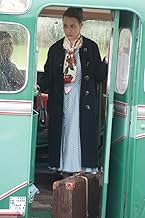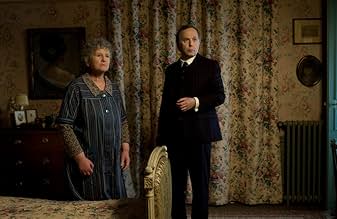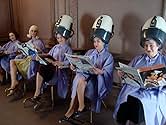IMDb-BEWERTUNG
7,1/10
10.866
IHRE BEWERTUNG
Im Paris der 1960er-Jahre wird das Leben eines konservativen Ehepaars von zwei spanischen Dienstmädchen kräftig durcheinander gewirbelt.Im Paris der 1960er-Jahre wird das Leben eines konservativen Ehepaars von zwei spanischen Dienstmädchen kräftig durcheinander gewirbelt.Im Paris der 1960er-Jahre wird das Leben eines konservativen Ehepaars von zwei spanischen Dienstmädchen kräftig durcheinander gewirbelt.
- Regie
- Drehbuch
- Hauptbesetzung
- Auszeichnungen
- 2 Gewinne & 3 Nominierungen insgesamt
Empfohlene Bewertungen
The movie plot about the life of Spanish immigrants in France in the 1960s showing experiences of poor maids as immigrants and adequately reflecting us how was the life of that time . In 1960s Paris, a conservative couple's lives are turned upside down by various Spanish maids . The peculiar marriage called Jean-Louis Joubert (Fabrice Luchini) and Suzanne Joubert (Sandrine Kiberlain) carry out a different life , as Jean-Louis is a hard-working executive and Suzanne is a snobbish wife . The affluent man and the selfish woman live a dull life and they have two arrogant children in a boarding school . At least until due to fortuitous events , there appears Maria (Natalia Verbeke) , the beautiful new maid at the service of Jean-Louis' family, makes him discover the servants' quarter on the sixth floor of the luxurious building he owns and lives in . There lives a community (Carmen Maura as Concepción Ramirez , Lola Dueñas as Berta Ojea as Dolores Carbalan , Nuria Solé as Teresa and Concha Galán as Pilar) of likable Spanish maids , they have said goodbye their families and went abroad . There take place the problems to adapt into a new life ; but later on , they discover a new and agreeable existence . The maids will help Jean-Louis to open to a new culture , introducing him a joyful Spanish group and a new approach of life . In their help and more precisely in the company of charming Maria , Jean-Louis to be turned into a good and philanthropist man .
This interesting film is full of humor , drama , touching scenes and good feeling . It is a simple , dramatic and humorous portrait of a time when the Spanish people had to go other countries in order to encounter a work . This amusing as well as funny picture deals about lives of the immigrants with a minor support in their live condition and including a touching and emotive finale . As in Spain of the 50s and 60s ruled by General Franco there's no job , there's no money , and there's no option for the poor people but to emigrate to a foreign country and attempting to encounter work . As it concerns about the Spanish way of life of a crowd of maids , their habits , costumes ; at the same time they improve the serious but uptight stockbroker who lives a steady yet boring life , being suddenly changed when appear the Spanish maids ; as Jean-Louis will gradually become another man, a better man . Actors are frankly magnificent with a first-rate acting for whole cast . Sensational Fabrice Luchini along with the wife played Sandrine Kinberlain and a gorgeous as well as sympathetic Natalia Verbeke . Special mention to the group of Spanish maids magnificently performed by Carmen Maura , Lola Dueñas , Berta Ojea , among others . Colorful and evocative cinematography by Jean Claude Larrieu . Imaginative as well as sensitive original Music by Jorge Arriagada , Raul Ruiz's usual . It was a success among spectators, as well as a hit smash in the various film festivals it took part in ; as it achieved Prix d'interprétation à Natalia Verbeke au festival Sarlat 2010 .
The motion picture was very well directed by Philippe Le Guay . Philippe Le Guay took inspiration from his own childhood , his father was a stockbroker like Jean-Louis Joubert in the film and he himself had a Spanish maid. This was the number one comedy smash hit from this director . He's a good writer and filmmaker who has directed a few movies , many of them starred by his fetish actor , Fabrice Luchini , such as "Cycling with Moliere" , "The Cost of Living" ¨L'année Juliette¨ and this ¨The Women on the 6th Floor" , his best picture .
This interesting film is full of humor , drama , touching scenes and good feeling . It is a simple , dramatic and humorous portrait of a time when the Spanish people had to go other countries in order to encounter a work . This amusing as well as funny picture deals about lives of the immigrants with a minor support in their live condition and including a touching and emotive finale . As in Spain of the 50s and 60s ruled by General Franco there's no job , there's no money , and there's no option for the poor people but to emigrate to a foreign country and attempting to encounter work . As it concerns about the Spanish way of life of a crowd of maids , their habits , costumes ; at the same time they improve the serious but uptight stockbroker who lives a steady yet boring life , being suddenly changed when appear the Spanish maids ; as Jean-Louis will gradually become another man, a better man . Actors are frankly magnificent with a first-rate acting for whole cast . Sensational Fabrice Luchini along with the wife played Sandrine Kinberlain and a gorgeous as well as sympathetic Natalia Verbeke . Special mention to the group of Spanish maids magnificently performed by Carmen Maura , Lola Dueñas , Berta Ojea , among others . Colorful and evocative cinematography by Jean Claude Larrieu . Imaginative as well as sensitive original Music by Jorge Arriagada , Raul Ruiz's usual . It was a success among spectators, as well as a hit smash in the various film festivals it took part in ; as it achieved Prix d'interprétation à Natalia Verbeke au festival Sarlat 2010 .
The motion picture was very well directed by Philippe Le Guay . Philippe Le Guay took inspiration from his own childhood , his father was a stockbroker like Jean-Louis Joubert in the film and he himself had a Spanish maid. This was the number one comedy smash hit from this director . He's a good writer and filmmaker who has directed a few movies , many of them starred by his fetish actor , Fabrice Luchini , such as "Cycling with Moliere" , "The Cost of Living" ¨L'année Juliette¨ and this ¨The Women on the 6th Floor" , his best picture .
Philippe Le Guay and Fabrice Luchini, two names that go together well, are more than ever synonymous with good quality comedy. If you want to have a good time, feel free to see the three films they collaborated on: "L'année Juliette" (1995), in which Luchini makes his life awfully complicated by inventing himself a mistress ; "Le coût de la vie" (2003), where Luchini makes his life ... awfully complicated by being too tight-fisted ; and coming now "Les femmes du 6e étage" (2010), with Luchini in yet another funny role in yet another well- written comedy signed Le Guay.
This time Luchini is Jean-Louis Joubert, a Parisian stockbroker. Like Camille in "L'année Juliette" and Brett in "Le coût de la vie", the character he joyfully slips into is very imperfect and his defects and shortcomings are a sure source of laughter but, unlike in the two former films, Camille will evolve and open up to his true self, making him a more engaging hero than usual. The beginning of the movie illustrates to great effect the imperfect Jean-Louis living his regular but restricted life in his spacious luxury apartment. He is married to a stiff-necked socialite named Suzanne and has two arrogant teenage sons who, being boarders, are currently away from home. The climaxes of his life, besides making money out of thin air, are eating a perfectly cooked soft-boiled egg and being bullied by his old Breton maid. But things start changing once Suzanne hires Maria, a charming young Spanish maid. For some reason some day Jean-Louis follows Maria up the stairs to the sixth floor and discovers a "terra incognita", in other words the maid's rooms below the roofs and the strange people who inhabit them, a handful of female Spanish immigrants. Against all odds this reactionary grand bourgeois develops an instant liking for these women and for their civilization. And of course, he will fall for Maria, but not only because she is pretty, mainly because she belongs to the new world he has just discovered.
A feel good movie in a way, "Les femmes du 6e étage" is much more than just that. It is also and none the less a committed film which, although set in the 1960s, denounces evils still plaguing today's society like, for example, the appalling way immigrants are exploited by their employers and ill-thought of by a majority of the natives of their "home" country, the selfishness of tourists who will not know about the political and social situation of the countries where they spend their holidays (1962's Spain can be replaced in the 2000s by Cuba, Egypt, Tunisia and many other countries)... Conversely the film is a call for tolerance and open-mindedness, for listening to one's heart rather than one's interest. But be reassured, this dimension, although crucial, remains underlying. There are no such things as preaching or political slogans, only a fine cocktail of good acting and tender humor. And sincerity. Did you know that for that matter that Philippe Le Guay had a Spanish maid when he was a kid and that his father was a broker just like Jean-Louis? Did you know that the actresses playing the maids are all Spanish and that some of them do not even speak French? That Luchini did not know a word of Spanish before starting the film? All these facts are good points which contribute to a welcome feeling of authenticity that enhances the film.
To come back to Fabrice Luchini, he is at his best in "Les femmes du 6e étage" for two reasons: first because his character is three-dimensional and goes beyond caricature (if Jean-Louis is stiff, haughty and narrow-minded it is because he reproduces the values inculcated in him both by his parents and by his social class, not because he is rotten to the core) ; second because Fabrice shows the necessary restraint quite in keeping with the role. The result is just perfect. And the rest of the cast is on the par with him: Natalia Verbeke, fresh and adorable as Luchini's love interest ; Sandrine Kiberlain, excellent as Luchini's uptight but not so superficial wife ; and the impeccable ensemble of Spanish actresses, including Carmen Maura and Lola Dueñas (two Almodovar fixtures), Berta Ojea, Nuria Solé and Concha Galan, as the servants from Spain. Also to be acclaimed are Annie Mercier as the spiteful janitor and gloomy-faced Philippe du Janerand as Piquer, Luchini's right-hand man.
Intelligent, sensitive and funny, "Les femmes du 6e étage", the third effort of the winning duo Le Guay-Luchini", deserves its success at the box-office and will not disppoint you.
This time Luchini is Jean-Louis Joubert, a Parisian stockbroker. Like Camille in "L'année Juliette" and Brett in "Le coût de la vie", the character he joyfully slips into is very imperfect and his defects and shortcomings are a sure source of laughter but, unlike in the two former films, Camille will evolve and open up to his true self, making him a more engaging hero than usual. The beginning of the movie illustrates to great effect the imperfect Jean-Louis living his regular but restricted life in his spacious luxury apartment. He is married to a stiff-necked socialite named Suzanne and has two arrogant teenage sons who, being boarders, are currently away from home. The climaxes of his life, besides making money out of thin air, are eating a perfectly cooked soft-boiled egg and being bullied by his old Breton maid. But things start changing once Suzanne hires Maria, a charming young Spanish maid. For some reason some day Jean-Louis follows Maria up the stairs to the sixth floor and discovers a "terra incognita", in other words the maid's rooms below the roofs and the strange people who inhabit them, a handful of female Spanish immigrants. Against all odds this reactionary grand bourgeois develops an instant liking for these women and for their civilization. And of course, he will fall for Maria, but not only because she is pretty, mainly because she belongs to the new world he has just discovered.
A feel good movie in a way, "Les femmes du 6e étage" is much more than just that. It is also and none the less a committed film which, although set in the 1960s, denounces evils still plaguing today's society like, for example, the appalling way immigrants are exploited by their employers and ill-thought of by a majority of the natives of their "home" country, the selfishness of tourists who will not know about the political and social situation of the countries where they spend their holidays (1962's Spain can be replaced in the 2000s by Cuba, Egypt, Tunisia and many other countries)... Conversely the film is a call for tolerance and open-mindedness, for listening to one's heart rather than one's interest. But be reassured, this dimension, although crucial, remains underlying. There are no such things as preaching or political slogans, only a fine cocktail of good acting and tender humor. And sincerity. Did you know that for that matter that Philippe Le Guay had a Spanish maid when he was a kid and that his father was a broker just like Jean-Louis? Did you know that the actresses playing the maids are all Spanish and that some of them do not even speak French? That Luchini did not know a word of Spanish before starting the film? All these facts are good points which contribute to a welcome feeling of authenticity that enhances the film.
To come back to Fabrice Luchini, he is at his best in "Les femmes du 6e étage" for two reasons: first because his character is three-dimensional and goes beyond caricature (if Jean-Louis is stiff, haughty and narrow-minded it is because he reproduces the values inculcated in him both by his parents and by his social class, not because he is rotten to the core) ; second because Fabrice shows the necessary restraint quite in keeping with the role. The result is just perfect. And the rest of the cast is on the par with him: Natalia Verbeke, fresh and adorable as Luchini's love interest ; Sandrine Kiberlain, excellent as Luchini's uptight but not so superficial wife ; and the impeccable ensemble of Spanish actresses, including Carmen Maura and Lola Dueñas (two Almodovar fixtures), Berta Ojea, Nuria Solé and Concha Galan, as the servants from Spain. Also to be acclaimed are Annie Mercier as the spiteful janitor and gloomy-faced Philippe du Janerand as Piquer, Luchini's right-hand man.
Intelligent, sensitive and funny, "Les femmes du 6e étage", the third effort of the winning duo Le Guay-Luchini", deserves its success at the box-office and will not disppoint you.
A great review by Robert Beames (coulden't have done it better myself!!) It has been given the more toner-friendly English language title of Service Entrance, but comic French drama Les Femmes Du 6eme Etage translates literally as The Women on the 6th Floor. Shown out of competition in Berlin, the film was very warmly received thanks in part to the performances of its sweet and amiable leading man, Fabrice Luchini, and its beautiful Spanish leading lady played by Natalia Verbeke. These actors combine with the film's leisurely pacing and entertaining scenario to ensure that it is a winsome and inoffensive crowd-pleaser.
The film, set in the 1960s, follows a wealthy, middle-aged Parisian stockbroker named Jean-Louis (Luchini) whose long-standing maid quits following a row with his demanding wife Suzanne (Sandrine Kiberlain). Unable to clean up after themselves, the couple desperately need a new maid. But when Suzanne's high society friends insist French maids aren't the done thing anymore, she enlists the help of Maria (Natalia Verbeke), a feisty, young Spanish immigrant. Jean-Louis forms an instant and obsessive attraction to her and to all things Spanish, soon striking up unlikely friendships with all the Spanish ladies who live in the servant's quarters above his home – a place he knows nothing about despite living in the building his entire life. Worlds collide and good-natured japes ensue as he helps each lady adjust to life in France whilst himself inheriting a new found love of life.
I don't think it's necessarily a coincidence that both the more shamelessly enjoyable films I've seen here up to now have been broad comedies about cultural difference and histories of mass immigration – with Almanya looking at German-Turks and Service Entrance exploring the relationship, and the comedy that comes of misunderstanding, between the French and their Spanish workforce. Immigration is still a political hot potato issue in these countries, as it remains in much of Europe, and maybe light-hearted comedy is seen as the best way to preach tolerance, reaching a bigger audience than earnest polemic. In mocking bigotry and by setting it in the past (as an old fashioned attitude) perhaps it is felt that people might be less inclined to identify with those views.
In any case both films are funny and have their hearts firmly in the right place. This French offering is gentler and less ballsy than it's Turkish-German counterpart, but no less enjoyable. The character of Jean-Louis is incredibly easy to like, being child-like in his enthusiasm for his new-found interest in Spain. The character of Suzanne is also refreshingly balanced and nuanced. She'd usually be a two-dimensional figure we would be encouraged to dislike in order to make it permissible for Jean-Louis to consider romance with Maria and yet the film doesn't go down that route: she can be annoying and insensitive but she isn't a nasty person. Maria and the other Spanish ladies are also a joy to watch as they interact with one another and fuss over cheerful little Jean-Louis.
Service Entrance is the filmic equivalent of a soufflé and certainly not a tough watch typical of the standard festival fare. Indeed it falls into the dubious realm of the "feel good" movie. But sandwiched, as it is here, between two-hour long Shakespeare adaptations, Bela Tarr movies, Argentinian slow cinema and films about nuclear disasters, it is exactly the kind of film you need to see in order to keep sane. It is difficult to say whether wider criticism in France will be anything like as positive when removed from this context on theatrical release, but here it offered exactly what was needed and nobody appreciated that more than I.
The film, set in the 1960s, follows a wealthy, middle-aged Parisian stockbroker named Jean-Louis (Luchini) whose long-standing maid quits following a row with his demanding wife Suzanne (Sandrine Kiberlain). Unable to clean up after themselves, the couple desperately need a new maid. But when Suzanne's high society friends insist French maids aren't the done thing anymore, she enlists the help of Maria (Natalia Verbeke), a feisty, young Spanish immigrant. Jean-Louis forms an instant and obsessive attraction to her and to all things Spanish, soon striking up unlikely friendships with all the Spanish ladies who live in the servant's quarters above his home – a place he knows nothing about despite living in the building his entire life. Worlds collide and good-natured japes ensue as he helps each lady adjust to life in France whilst himself inheriting a new found love of life.
I don't think it's necessarily a coincidence that both the more shamelessly enjoyable films I've seen here up to now have been broad comedies about cultural difference and histories of mass immigration – with Almanya looking at German-Turks and Service Entrance exploring the relationship, and the comedy that comes of misunderstanding, between the French and their Spanish workforce. Immigration is still a political hot potato issue in these countries, as it remains in much of Europe, and maybe light-hearted comedy is seen as the best way to preach tolerance, reaching a bigger audience than earnest polemic. In mocking bigotry and by setting it in the past (as an old fashioned attitude) perhaps it is felt that people might be less inclined to identify with those views.
In any case both films are funny and have their hearts firmly in the right place. This French offering is gentler and less ballsy than it's Turkish-German counterpart, but no less enjoyable. The character of Jean-Louis is incredibly easy to like, being child-like in his enthusiasm for his new-found interest in Spain. The character of Suzanne is also refreshingly balanced and nuanced. She'd usually be a two-dimensional figure we would be encouraged to dislike in order to make it permissible for Jean-Louis to consider romance with Maria and yet the film doesn't go down that route: she can be annoying and insensitive but she isn't a nasty person. Maria and the other Spanish ladies are also a joy to watch as they interact with one another and fuss over cheerful little Jean-Louis.
Service Entrance is the filmic equivalent of a soufflé and certainly not a tough watch typical of the standard festival fare. Indeed it falls into the dubious realm of the "feel good" movie. But sandwiched, as it is here, between two-hour long Shakespeare adaptations, Bela Tarr movies, Argentinian slow cinema and films about nuclear disasters, it is exactly the kind of film you need to see in order to keep sane. It is difficult to say whether wider criticism in France will be anything like as positive when removed from this context on theatrical release, but here it offered exactly what was needed and nobody appreciated that more than I.
THE WOMEN ON THE 6TH FLOOR (Les femmes du 6ème étage) is a delightful bit of French pastiche that entertains while it also provides insight into several problems - immigration, class distinction, rich controlling poor, and the polar extremes of between the wealth and the working class. Fortunately the story as written by Jérôme Tonnerre and writer/director Philippe Le Guay takes place in the 1960s, offering the audience to glance back at period when social reforms were in the gestational phase and in doing so the film allows the comedy to reign - a fact that makes the reality eventually more poignant.
The story takes place in Paris in 1963 in an elegant neighborhood where Jean-Louis Joubert (Fabrice Luchini) is a serious but uptight stockbroker, married to Suzanne (Sandrine Kiberlain), a starchy class-conscious woman and father of two arrogant teenage boys, (Camille Gigot and Jean-Charles Deval) currently in a boarding school. Jean-Louis lives a steady yet boring life while Suanne busies herself with luncheon appointments, hair appointments, charities, etc. Jean-Louis' mother had been living with the Jouberts until her recent death and now Suzanne forces Jean-Louis to move all of the deceased woman's things to the attic on the 6th floor, an act that infuriates the longtime French maid Germaine (Michèle Gleizer) who leaves the household in disgust. Naturally everything deteriorates an Suzanne must find a new maid. She encounters Maria (Natalia Verbeke) recently immigrated from Spain, offers her a trial employment, and Maria, who becomes friends with the group of maids who live in the disgusting squalor of the 6th floor of the building: naturally these Spanish maids bond and help Maria bring the Joubert household to a state of perfection. Jean-Lois is thrilled with the new maid and discovers the other maids, hears their problems with the sewer and other poor conditions, and sets out to befriend these wonderful ladies who are living in his building : the redoubtable Carmen Maura, Lola Dueñas, Berta Ojea, Nuria Solé, and Concha Galán. These lovely and deeply appreciative lively Spanish maids help Jean- Louis to become open to a new civilization and a new approach of life. In their company - and especially in the company of beautiful Maria - Jean-Louis will gradually become another man, a better man.
The acting is first rate, the subplots embroider the main story with fine finesse, and the sense of the transformation of one wealthy but emotionally vapid man into the loving charmer he becomes makes for a very fine comedy. The ending (three years later) is a bit vapid and cheapens the story quality, but by that time the audience is so entranced with this new vision of camaraderie that it matters little. This is a refreshing, well made, exceptionally entertaining film that boast a particularly fine cast of ensemble actors. In French and Spanish with English subtitles. Grady Harp, March 12
The story takes place in Paris in 1963 in an elegant neighborhood where Jean-Louis Joubert (Fabrice Luchini) is a serious but uptight stockbroker, married to Suzanne (Sandrine Kiberlain), a starchy class-conscious woman and father of two arrogant teenage boys, (Camille Gigot and Jean-Charles Deval) currently in a boarding school. Jean-Louis lives a steady yet boring life while Suanne busies herself with luncheon appointments, hair appointments, charities, etc. Jean-Louis' mother had been living with the Jouberts until her recent death and now Suzanne forces Jean-Louis to move all of the deceased woman's things to the attic on the 6th floor, an act that infuriates the longtime French maid Germaine (Michèle Gleizer) who leaves the household in disgust. Naturally everything deteriorates an Suzanne must find a new maid. She encounters Maria (Natalia Verbeke) recently immigrated from Spain, offers her a trial employment, and Maria, who becomes friends with the group of maids who live in the disgusting squalor of the 6th floor of the building: naturally these Spanish maids bond and help Maria bring the Joubert household to a state of perfection. Jean-Lois is thrilled with the new maid and discovers the other maids, hears their problems with the sewer and other poor conditions, and sets out to befriend these wonderful ladies who are living in his building : the redoubtable Carmen Maura, Lola Dueñas, Berta Ojea, Nuria Solé, and Concha Galán. These lovely and deeply appreciative lively Spanish maids help Jean- Louis to become open to a new civilization and a new approach of life. In their company - and especially in the company of beautiful Maria - Jean-Louis will gradually become another man, a better man.
The acting is first rate, the subplots embroider the main story with fine finesse, and the sense of the transformation of one wealthy but emotionally vapid man into the loving charmer he becomes makes for a very fine comedy. The ending (three years later) is a bit vapid and cheapens the story quality, but by that time the audience is so entranced with this new vision of camaraderie that it matters little. This is a refreshing, well made, exceptionally entertaining film that boast a particularly fine cast of ensemble actors. In French and Spanish with English subtitles. Grady Harp, March 12
Fabrice Lucchini, famous French actor well-known for his flamboyant demeanour, is playing an invisible man in this film, which placed in Paris in the 1960's. He opens up to life while meeting the group of Spaniard maids living above his apartment. His wife, played by Sandrine Kiberlain, disagree with him because he's talking to these people who are not from the same social class. Both Lucchini and Kiberlain are very good in this film. The actress who's playing Maria Gonzalez cast, Natalia Verbeke, is offering a splendid performance. I've never seen her playing before. The end of the movie is quite common and deceiving, but it's doesn't erase the fun we had watching this very niece movie.
Wusstest du schon
- WissenswertesPhilippe Le Guay took inspiration from his own childhood. His father was a stockbroker like Jean-Louis Joubert in the film and he himself had a Spanish maid.
- PatzerIn the street, most (if not all) men wear hats, caps or Basque berets. In France, most men stopped wearing headgear in the 1950s (in cities at least). By 1960, the vast majority of men were hatless.
- VerbindungenFeatured in Ebert Presents: At the Movies: Folge #2.13 (2011)
- SoundtracksItsi Bitsi, Petit Bikini
(Itsy Bitsy Teenie Weenie Yellow Polkadot Bikini)
Music by Lee Pockriss
English lyrics by Paul Vance
French lyrics by Lucien Morisse and André Salvet
Performed by Dalida
© Emily Music Corporation and Music Sales Corporation
Avec l'aimable autorisation de Campbell Connelly France
(P) 1960 Barclay
Avec l'autorisation de Universal Muis Vision
Top-Auswahl
Melde dich zum Bewerten an und greife auf die Watchlist für personalisierte Empfehlungen zu.
- How long is The Women on the 6th Floor?Powered by Alexa
Details
- Erscheinungsdatum
- Herkunftsland
- Offizielle Standorte
- Sprachen
- Auch bekannt als
- The Women on the 6th Floor
- Drehorte
- Produktionsfirmen
- Weitere beteiligte Unternehmen bei IMDbPro anzeigen
Box Office
- Budget
- 7.000.000 € (geschätzt)
- Bruttoertrag in den USA und Kanada
- 719.823 $
- Eröffnungswochenende in den USA und in Kanada
- 26.200 $
- 9. Okt. 2011
- Weltweiter Bruttoertrag
- 27.533.970 $
- Laufzeit1 Stunde 42 Minuten
- Farbe
- Sound-Mix
- Seitenverhältnis
- 1.85 : 1
Zu dieser Seite beitragen
Bearbeitung vorschlagen oder fehlenden Inhalt hinzufügen

Oberste Lücke
By what name was Nur für Personal! (2010) officially released in India in English?
Antwort
![Bande-annonce [OV] ansehen](https://m.media-amazon.com/images/M/MV5BNTdmOTBjM2UtOTUyMS00NDViLWI4NWEtNmVhODc1NDVjN2NlXkEyXkFqcGdeQXRyYW5zY29kZS13b3JrZmxvdw@@._V1_QL75_UX500_CR0)



























